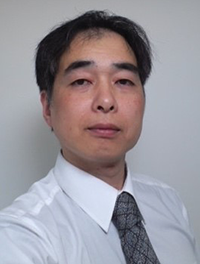Name of supervisor: Kozo Ohkusu-Tsukada, DVM. PhD.
Position: Professor
researchmap
KAKEN researcher number: 90304930
ORCID ID:0000-0002-4998-8895
Main research theme:
1)Gut microbiota and atopic dermatitis onset mechanism
2) Basic and clinical research on personalized cancer immunotherapy for dogs
Research keywords: Atopic dermatitis, Gut microbiota, Canine cancer vaccine, DLA-88 types
Lab location: Laboratory of Veterinary Pathology, 3rd floor, Building D
E-mail:tkd-oks (@mark) nvlu.ac.jp
Research
1) Gut microbiota and atopic dermatitis onset mechanism
We found that dextran sodium sulfate (DSS)-induced colitis in NC/Nga SPF mice causes atopic dermatitis (AD), and we have been investigating the relevance between the gut microbiota and AD onset by using this model. It has been found that the AD onset can be reduced by blocking DSS-induced colitis with anti-inflammatory drugs or with improving the gut environment. In previous reports, although human statistical analysis suggested a causal relation between an enteritis and the pathogenesis of AD, the mechanism was unclear. We aim to elucidate the mechanism of AD onset from enteritis by using that model.
2) Basic and clinical research on personalized cancer immunotherapy for dogs
The “survivin”, a target antigen for cancer, is often expressed in various malignant tumors. Therapeutic cancer vaccines are a method that is expected to efficiently kill cancer by inducing “survivin”-specific cytotoxic T lymphocytes (CTLs) through intradermal inoculation. To finally reject cancer using therapeutic cancer vaccines, there are several steps. First, ① whether “survivin” is expressed in cancer cells. ② whether it is possible to prepare as an epitope for vaccine a fragment (9 amino acid peptide) that matches the canine MHC class I (DLA-88) types in dendritic cells presented “survivin” because of inducing survivin-specific CTLs. ③ Whether an adjuvant is best selection for efficiently phagocytize survivin epitopes into dendritic cells. ④ Even if CTLs can be induced, the CTLs may get the exhausted condition due to immune checkpoints PD-1 (if PD-L1 is expressed on tumor cells, CTLs activity is suppressed), or become an unresponsive (immunologically tolerant) due to vaccinations repeated. Whether it is able to take measures to avoid those CTLs inhibition into the treatment program. We aim to overcome those challenges. Now, the clinical trials of dogs with advanced technology are being started at Veterinary Medical Teaching Hospital (VMTH).
Guidance policy for graduate students
1) Guidance on experimental techniques:
We educate to experiments based on animal welfare and ethics, instruct how to breed and maintain mouse strains. You can learn techniques of in vivo experiments such as anesthesia, oral administration using a feeding needle, blood sampling, intravenous injection, subcutaneous injection, and intraperitoneal injection. After euthanasia, we collect lymph nodes, spleen, etc., prepare some cell suspensions, and separate the cells using magnetic antibodies. At the same time, various organs are collected, pasted onto cardboard, and fixed in formalin, then, specimens are prepared for histological examination under a microscope. You can learn how to culture and passage cell lines, and how to make a syngeneic mouse tumor model. For analysis, after extracting proteins, RNA, and DNA, Western blot analysis, RT-PCR analysis, and sequence analysis are used. ELISA for samples of culture supernatant or blood serum and flow cytometry for cell proliferation analysis or cytotoxic activity analysis are used.
2) Guidance on writing the paper:
First, you design “Figures” for the paper and write the method and results. You summarize novel findings and significant points of “Figures”. You search relevant references to highlight the important contents of this study. You train to put things together on your own.
3) Guidance on financial support for research initiatives:
We introduce various scholarships and provide guidance on how to be adopted a Japan Society for the Promotion of Science (JSPS) Research Fellowships for Young Scientists (DC2).
Publications
(*Corresponding author)
1.Konnai M, Takahashi K, Machida Y, Michishita M, Ohkusu-Tsukada K*.
Intrahepatic eosinophilic proliferative phlebitis in Japanese black cattle indicate allergies involving mast cell tryptase-dependent activation.
Front Vet Sci. 2022. 9:972180.
2.Ohkusu-Tsukada K*, Yamashita T, Tsukada T, Takahashi K.
Low expression of a Ddm7/Ldm7-hybrid mutant (D/Ldm7) in the novel haplotype H-2nc identified in atopic dermatitis model NC/Nga mice.
Genes Immun. 2019. 20(1):74-81.
3.Ohkusu-Tsukada K*, Ito D, Okuno Y, Tsukada T, Takahashi K.
Signs of atopic dermatitis and contact dermatitis affected by distinct H2-haplotype in the NC/Nga genetic background.
Sci Rep. 2018. 8(1):2586.
4.Ohkusu-Tsukada K*, Ito D, Takahashi K.
The role of proteasome inhibitor MG132 in 2,4-dinitrofluorobenzene-induced atopic dermatitis in NC/Nga mice.
Int Arch Allergy Immunol. 2018. 176(2):91-100.
5.Ohkusu-Tsukada K*, Tsukada T, Takahashi K.
Clonal deletion of T cell repertoires with specific T cell receptor Vβ chains by two endogenous superantigens in NC/Nga mice.
Biosci Biotechnol Biochem. 2017. 81(11):2160-63.
6.Kishida K†, Ohkusu-Tsukada K†, Hori M, Konnai M, Abiko C, Suzuki Y, Yamanome Y, Yoshimura H, Michishita M, Takahashi K*. (†Equal contribution)
Investigation of the roles of fascioliasis and food allergy in intrahepatic eosinophilic proliferative pylephlebitis in Japanese Black cattle.
Vet J. 2013. 196(2):160-6.
7.Ohkusu-Tsukada K, Ohta S, Kawakami Y, Toda M*.
Adjuvant effects of formalin-inactivated HSV through activation of dendritic cells and inactivation of myeloid-derived suppressor cells in cancer immunotherapy.
Int J Cancer. 2011. 128(1):119-31.
8.Ohkusu-Tsukada K*, Toda M, Udono H, Kawakami Y, Takahashi K.
Targeted inhibition of IL-10-secreting CD25- Treg via p38 MAPK suppression in cancer immunotherapy.
Eur J Immunol. 2010. 40(4):1011-21.
9.Ueda R, Ohkusu-Tsukada K, Fusaki N, Soeda A, Kawase T, Kawakami Y, Toda M*.
Identification of HLA-A2- and A24-restricted T-cell epitopes derived from SOX6 expressed in glioma stem cells for immunotherapy.
Int J Cancer. 2010. 126(4):919-29.
10.Ohkusu-Tsukada K, Tominaga N, Udono H, Yui K*.
Regulation of the maintenance of peripheral T-cell anergy by TAB1-mediated p38 alpha activation.
Mol Cell Biol. 2004. 24(16):6957-66.
11.Tominaga N, Ohkusu-Tsukada K, Udono H, Abe R, Matsuyama T, Yui K*.
Development of Th1 and not Th2 immune responses in mice lacking IFN-regulatory factor-4
Int Immunol. 2003. 15(1):1-10.
12.Ohkusu-Tsukada K, Tsukada T, Isobe K*.
Accelerated development and aging of the immune system in p53-deficient mice.
J Immunol. 1999. 163(4):1966-72.

